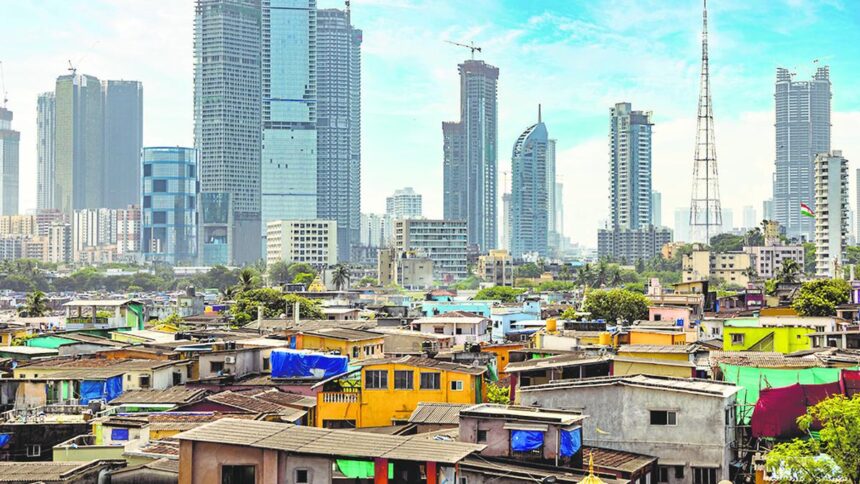[ad_1]

The slums on the shores of Mumbai, against the skyscrapers under construction.
| Photo Credit: Getty Images
The story so far: October 31 is observed every year as World Cities Day. The world’s urban population has reached an estimated 4.7 billion, or 57.5% of the world’s total population, with projections to double by 2050. The theme for this year’s World Cities Day is ‘Youth Climate Changemakers: Catalysing Local Action for Urban Sustainability’.
What are challenges faced by cities?
The UN underscores that cities face unprecedented challenges, especially climate change. While strides have been made towards Sustainable Development Goals (SDGs), urban centres remain plagued by poverty, inequality, and environmental degradation. In the Global South, these challenges are intensified by rapid urbanisation, inadequate infrastructure, and limited resources. Cities here often suffer from housing shortages, poor access to clean water and sanitation, and increased vulnerability to climate-related events.
What about Indian urbanisation?
India’s urbanisation trajectory differs from the cities in the Global North. In Western countries, urbanisation followed industrialisation, which created jobs that absorbed rural labour. Their urbanisation was sustained also because of massive economic transfers from colonies. Economist Utsa Patnaik has highlighted that India alone contributed over $45 trillion to England’s economy during colonial rule. In contrast, India’s urbanisation is largely driven by economic distress, resulting in “poverty-driven urbanisation,” with both rural-to-urban and urban-to-urban migration. During the COVID-19 pandemic, the strain on urban planning became apparent, as reverse migration trends highlighted gaps in infrastructure.
What are urban challenges in India?
Without a 2021 Census, India lacks precise data on its urban population. World Bank estimates suggest around 40% of India’s population live in urban areas, in around 9,000 statutory and census towns. The main challenges Indian cities face include inadequate spatial planning, climate change, massive migration, growing inequality and social segregation, and governance limitations.
Urban planning agencies have struggled due to two main issues. First, spatial and temporal plans are often outdated and fail to accommodate population growth. Since the 1980s, deindustrialisation has led to job losses in cities like Ahmedabad, Delhi, Surat, and Mumbai. Many workers displaced by this trend moved to peri-urban areas, where they live in overcrowded conditions. Currently, 40% of India’s urban population resides in slums. Second, plans often focus on capital growth rather than people’s needs, leading to a lack of local ownership and engagement in the planning process. Similarly, climate change severely impacts Indian cities. Cities face severe pollution and are increasingly subject to urban flooding and “heat island effects.” Among the 10 most polluted cities in India, eight are in the NCR region around Delhi.
Additionally, urbanisation was once believed to be neutral regarding social and religious dynamics, but Indian cities are increasingly segregated along these lines. Inequality is widening, with exclusive developments catering to the wealthy while millions lack basic housing. For instance, DLF’s “The Dahlias” project in Gurugram offers apartments starting at ₹100 crore, a stark contrast to the two crore urban Indians without shelter. Most city jobs (around 90%) are in the informal sector, often with poor working conditions and no job security.
Despite the 74th Constitutional Amendment, most Indian cities remain controlled by undemocratic bodies. Though cities have elected representatives, they rarely control urban planning, which is often outsourced to parastatals and private entities. For example, less than three of the 18 functions outlined in the 12th Schedule have been universally transferred to urban governments, and cities receive a mere 0.5% of the GDP in intergovernmental transfers. As we observe World Cities Day, these challenges highlight the need for comprehensive national interventions.
The writer is former deputy mayor, Shimla, and Member, Kerala Urban Commission.
Published – November 04, 2024 08:30 am IST
[ad_2]
Source link







